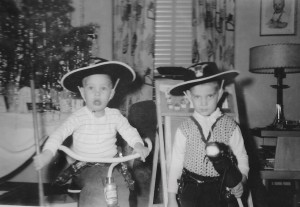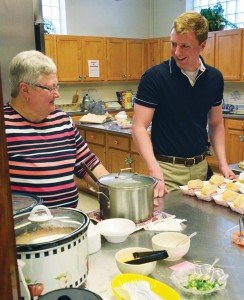
Concordia Seminary Newsroom
Forming Pastors and Deconesses for the 21st Century

By Dr. Timothy Saleska

Brothers Tom and Timothy Saleska.
When I was 6 years old, I broke my brother’s leg. We had gone to the movie theater because it had been raining all day and we were getting on my mom’s nerves. But the rain had stopped by the time we got home, so Tom and I went over to the neighbors’ house to swing on their swing set. They had one of those glider swings that you sat on facing each other, and you had to work together to make the thing go. So, we got on and started pumping, and the swing kept going higher and higher. In my mind, that’s just what we wanted. But on this day we went too high for my brother’s taste, and he got scared. He started crying at me to slow down. But you see, I liked frightening Tom. It was fun, and so I thought it would be a good idea to keep right on pumping. The legs of the swing set were lifting out of the ground, but I didn’t care. Tom, however, had had enough. He was determined to stop his death spiral at all costs. So, in Fred Flintstone style, he stuck his leg to the ground to apply the brakes. But when he did, his foot got caught between the ground and the foot bar of our swing. And that was it. I could see immediately that his foot was not pointing in the direction it needed to go.
Now, that’s what I remember. What I don’t remember is the reaction of my parents. I really don’t. I know that I must have gotten in trouble for it, but I don’t remember what happened. I do know that neither they nor my brother used it against me. They never dredged it up or held it over my head or failed to trust me because of it. They didn’t put me up for adoption. They continued to love me and care for me.
I am telling you this trivial little story in order to make a huge point. The point is one that you know because you have all experienced it. It is the claim that forgiveness (or lack thereof) has lasting consequences. Think about it this way: If my parents had refused to forgive me for breaking their son’s leg, then this little incident could have played an entirely different role in my life than it did. My parents could have never let me forget what I had done — simply by not forgiving me. And my foolishness would have risen like a wall between us. If you have ever had the misfortune of offending someone and that person has withheld his or her forgiveness from you, then you know what it means to feel unforgiven and how that can affect your life, your sense of peace, your joy. In some people, past sins haunt them every step of the way. They can’t shake them off.
So, when people ask me what makes a good pastor or deaconess, I immediately think about my own life and how I grew up in a house full of grace. Without forgiveness, where would I be? I think about how important it is that those in pastoral and diaconal ministry be people who know how to give and receive forgiveness. To put it in Lutheran categories: men and women who are Gospel-centered, not Law-centered. People whose “yes” is much louder than their “no.”

At Epiphany Lutheran Church, Pat Wachter, left, a church member, and Jess Biermann, a first-year Seminary student, serve food at a Lenten supper before Wednesday evening services March 16, 2016. Epiphany, located in the Holly Hills neighborhood of St. Louis, is Biermann’s Resident Field Education (RFE) congregation for the spring quarter.
Jesus loved us sinners so much and had so much compassion and mercy for us that He died for us — every one of us. Now, that’s an awful thing to think about. Someone died where I should have. But God didn’t hold that against us. He raised His Son. In the resurrection, it is as if God said, “Hey, look! I forgive you! My Son lives. Your sin is not important. You need not bear any guilt again.” Think of the consequences of this act of God. Life, not death. Salvation instead of damnation. Forgiveness has consequences indeed. The most important thing pastors and deaconesses can do is tangibly bring the love of Jesus and the forgiveness of Jesus into the lives of the broken sinners they serve. People in our world are dying for lack of forgiveness. What can people do with their guilt or their sin if there is no one to bring them forgiveness or show them the radical love of Jesus? In her book, The Secret Thoughts of an Unlikely Convert, Rosaria Butterfield writes, “Had a pastor named Ken Smith not shared the gospel with me for years and years, over and over again, not in some used-car-salesman way, but in an organic, spontaneous and compassionate way…I might never have met the most unlikely of friends, Jesus Christ himself.”
I look at that quote and think, “This pastor is the kind of student Concordia Seminary wants to form.” Our faculty is completely committed to teaching our students the scriptural and confessional truth that has been handed down to us. We are determined to form students who faithfully proclaim God’s Word and conduct their ministries in accord with it. To that end our curriculum features courses of study and experiences specifically designed to teach our students how to be faithful preachers, teachers, caregivers and leaders across a variety of contexts and cultures.
But we also are concerned with the hearts of every one of our students. We are interested in their personal and spiritual formation. We want them to love people and know how to relate to others and communicate well with them. We want them to be able to empathize and show people compassion. We want students who build relationships and bridges with others. We want them to experience joy and delight in ministry and know how to handle conflict in healthy ways. And so, we are also working hard to develop experiences both inside and outside the classroom that will give our students direction in how to nurture their strengths and work on areas in which they may be vulnerable.
I am always excited and humbled by the men and women the Holy Spirit sends to our Seminary. It is a powerful thing to see how willing they are to give their lives to serve others with the Gospel. Please pray that the Lord blesses the work of the Seminary and its students so that we can continue to send out laborers who are well-equipped to work in the fields that even now God is preparing.
This article originally appeared in the Spring 2016 Concordia Seminary Magazine.
Dr. Timothy Saleska (‘82) is dean of ministerial formation at Concordia Seminary, St. Louis.